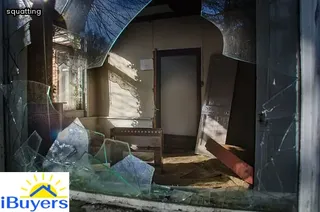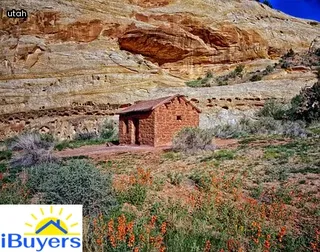In Utah, squatters are defined as someone who occupies a house or piece of real estate without the permission of the rightful owner.
This means that if someone has taken up residence in a property they do not own and have not been given permission to occupy, they are considered a squatter.
Squatting is illegal in Utah, although there are sometimes exceptions allowing for certain people to remain on the property until their legal rights have been determined.
Squatters can face fines and even jail time in some cases, so it is important to understand the laws surrounding squatting before attempting to take up residence in a property without permission.

Understanding the legal rights of squatters can be a daunting task in the state of Utah. It is important to know what steps to take to protect yourself from any potential issues that may arise from having a squatter on your property.
To begin with, you should always make sure to post a no trespassing sign clearly visible on or near the property. You should also check local ordinances for any laws related to eviction notices and follow them accordingly.
Be sure to document all communication with the squatter, including any attempts at negotiation, so that you can have evidence in case a court hearing is necessary. Additionally, it is always wise to consult an attorney who specializes in real estate and squatting laws as they can provide invaluable advice in situations like this.
Finally, it is essential that you remain proactive when dealing with squatters and continually monitor your property for signs of intrusion or other illegal activities. By following these steps, you can ensure that your rights are legally protected against any possible conflicts with squatters in Utah.
Removing squatters from rental properties in Utah can be a tricky process. In general, it is best for landlords to follow the legal and formal eviction process as outlined by the Utah Residential Landlord and Tenant Act.
However, depending on the specifics of the situation, there may be other options available. For example, if squatters are occupying a property but have not yet established a tenancy agreement or lease with the landlord, then they can typically be removed immediately without a court order or other legal proceeding.
The landlord should also make sure to give proper notice that the property is being reclaimed and that any persons living on it must vacate. Additionally, if squatters are found to be engaging in criminal activities such as burglary or vandalism while on the premises, then they can be removed without an eviction notice.
Ultimately, it is important for landlords to understand their rights and act accordingly when trying to remove squatters from their rental properties in Utah.

In the state of Utah, understanding squatters rights is essential for anyone interested in house or real estate possession. Adverse possession is a method of gaining title to a property without prior permission from the owner and it has both pros and cons.
On the plus side, adverse possession can provide a legitimate means of obtaining title to land that was previously abandoned or neglected. Additionally, if you are able to meet all of the requirements set out by Utah law, then you will be able to gain ownership with minimal costs.
On the downside however, adverse possession is not always easy; the process requires patience and an understanding of the legal system as there are many hoops to jump through in order to gain proper title. Furthermore, there may be some opposition from current owners who do not wish to part with their property, even if it has been unoccupied for years.
As such, it's important for those looking into adverse possession in Utah to weigh up both sides before making any decisions.
Flipping houses without money can be intimidating and challenging, but there are strategies that can help make it possible. Squatters rights in Utah provide legal pathways for house and real estate possession without cash.
To start, an individual needs to take possession of a home or property with permission from the current owner or by occupying an abandoned building. After obtaining authorization to enter the property, the next step is to establish residency by filing paperwork with local authorities.
This paperwork may include written notice of intent to occupy and proof of residence such as rent receipts. Furthermore, it is important to stay in compliance with the law by paying taxes, maintaining the property in good condition, and notifying neighbors of your presence.
Additionally, creating a lease agreement between you and former owners can provide additional protection against eviction. With careful planning and diligence, savvy investors can use squatters rights in Utah to flip houses with little or no money upfront.

Finding affordable home and car insurance in Utah is an important step for anyone who is looking to squat in the state. Insurance costs can vary depending on a variety of factors, such as your age, driving record, credit score and the type of coverage you need.
Knowing what types of coverage are available and how they will affect your premiums is essential when it comes to finding the best deal possible. Understanding how different insurance companies work with squatter's rights can be an invaluable asset when trying to secure quality coverage at an affordable rate.
Additionally, it's important to compare rates from multiple providers in order to ensure that you're getting the best value for your money. Taking the time to research and compare insurance policies before committing to one is a great way to make sure that you get the protection that you need while still keeping costs low.
Squatting rights in Utah can be a tricky topic to understand, and there are many important things to consider before you move into an unoccupied property. In Utah, the law states that squatters must have been living on the property for a certain period of time in order to claim it as their own.
If you remain on the property for more than seven years, you may be able to claim legal ownership of the property under adverse possession laws. To prove this, though, you must show that you have made improvements to the property or paid taxes on it over the course of your stay.
If you can demonstrate this, then you may be able to gain legal title to the house or land in question. It is also important to note that these laws apply differently depending on whether or not there is a lease agreement between yourself and the owner of the property – if there is an existing lease agreement then squatting rights will likely not apply.
Be sure to research local laws and regulations carefully before attempting to take possession of unused real estate in Utah as it can have serious consequences if done incorrectly.

Exploring Adverse Possession Laws in Utah In-Depth provides an important understanding of squatter's rights and the processes associated with possessing a home or real estate in the state. It is important to understand that, under adverse possession laws, a person may be able to take ownership of property they have been occupying for a specific period of time.
In order to do this, they must use the land as if they were its rightful owner. This includes paying all taxes and maintaining it in good condition.
In Utah, the law requires a certain period of uninterrupted occupation before title can be transferred from the current owner to a squatter. If these requirements are met, it is possible for squatters to gain title to property without going through lengthy legal proceedings.
Additionally, understanding which types of property are eligible for adverse possession is essential; most commonly residential and commercial properties but also land and trees can be claimed under these laws. Every case is unique but by researching the specifics of Utah's statutes on adverse possession and seeking legal advice where appropriate you can ensure your rights are properly exercised when dealing with house or real estate possession in Utah.
When it comes to understanding squatters rights in the state of Utah, it is important to know the facts about color of title claims. These claims can give individuals the right to possess a house or real estate if they have been in possession for a set period of time and meet certain requirements.
To make a successful color of title claim, two conditions must be met: a person must have possessed the property openly, notoriously, and continuously for seven years; and they must also have paid all taxes due on the property during that time. If these conditions are not met, then squatters do not acquire any rights to the property.
Additionally, when considering color of title claims, it is important to note that there are both formal and informal ways for making a claim. Informal methods include paying taxes on the property or making improvements on it which indicate ownership and intention to possess.
Formal methods involve filing an affidavit with court or using other legal proceedings such as ejectment to establish ownership. All these factors come into play when determining whether someone has acquired squatter's rights through color of title.

Paying property taxes on squatting rights in Utah is an important part of understanding the state's legal system. Squatting is when someone takes possession of a house or real estate without paying rent or obtaining permission from the owner.
To legally obtain squatting rights in Utah, you must pay the applicable property taxes and register with the county assessor’s office. Depending on the type of squatting, you may also need to pay a fee to register your claim.
Once registered, the squatters have certain protections from eviction and have the right to stay until they are evicted by a court order. In addition, if you remain in possession of a property for more than seven years, it can be considered yours under adverse possession laws in Utah.
It is important to understand your rights and responsibilities when it comes to paying property taxes as a squatter in Utah so you can best protect your interests and avoid any potential legal issues that could arise down the line.
Squatting rights in Utah can be a great tool for those looking to gain access to housing or real estate that they may not otherwise have. However, there are some benefits and drawbacks associated with this form of possession.
On one hand, squatters may be able to occupy a property without having to pay rent or purchase it outright, allowing them the opportunity to save money and sometimes even improve the property. On the other hand, squatting is illegal in most cases and can result in eviction from the property or criminal charges.
Additionally, there are often limits on what squatters can do with the property such as selling it or making major changes without permission from the owner. While understanding your rights as a squatter can be beneficial, it is important to weigh out all of these factors when considering if squatting is right for you.

When dealing with squatters, it is important to understand the legal options available in order to protect your property rights. In Utah, a squatter is defined as any tenant who remains in possession of a property without the express permission of the owner, and they are subject to certain legal remedies.
The most common recourse for dealing with squatters is an eviction notice issued by a court, which orders them to vacate the premises within a given period of time. If the squatter fails to comply with this order, then a landlord can file an unlawful detainer lawsuit against them.
This lawsuit seeks damages for unpaid rent and other costs associated with evicting the squatter from the property. Additionally, Utah laws provide for civil action against squatters who cause damage to property or otherwise interfere with an owner's ability to possess and use their real estate; this includes actions such as removing locks or altering fixtures on the property.
Finally, landlords may also seek criminal penalties if it is determined that a squatter has committed fraud or other illegal activity related to their occupancy of the premises. Ultimately, it is up to landowners in Utah to understand their rights under state laws in order to effectively deal with squatters and protect their real estate interests.
It is important to be aware of the best practices for avoiding squatters on your property to prevent any legal issues from arising. The first step to preventing squatters is to secure all entrances and exits to your property.
This includes making sure that all doors and windows are locked, and that fencing around the perimeter is properly maintained. Additionally, it is beneficial to post “No Trespassing” signs on the premises so that potential squatters are aware of the consequences of entering private property without authorization.
Furthermore, it can be helpful to install security cameras or alarms as a deterrent against trespassers. Lastly, if you do encounter a squatter on your property, it is important to take immediate action in order to protect your rights as a homeowner.
Contacting local law enforcement or an attorney can help ensure that squatter rights laws in Utah are being followed and enforced appropriately.

In order to successfully file a claim for adverse possession in Utah, there are several requirements that must be met. The squatter must have been occupying the property for a consecutive period of seven years or more and must have had exclusive use of it during that time.
It is also important that the squatter's occupation of the property has been continuous and uninterrupted in order to qualify as adverse possession. Furthermore, the claim needs to be brought forward in good faith, meaning that the squatter did not maliciously enter onto someone else's land with intent to take it away from them.
Lastly, any payment made by the squatter during their occupation of the land should be reasonable and fair. All of these factors need to be taken into consideration when attempting to file an adverse possession claim in Utah.
Squatting rights in the state of Utah can be a confusing subject. It is important to understand the commonly used terms related to squatter's rights in order to maximize the benefits of such a legal arrangement.
Adverse possession, also known as squatting, is when someone takes possession of a piece of property without permission from the owner and holds it for an extended period of time. A prescriptive right, on the other hand, is when someone uses another's land as if they own it but does not take actual ownership of it.
This happens when someone improves or maintains the property over a certain period of time. These two concepts are often confused with one another when discussing squatter's rights in Utah.
Furthermore, one must understand that in order for either of these concepts to be established, certain criteria must be met and documented accordingly. In addition, there are specific statutes that define what constitutes possession and how long it must be maintained for either concept to become valid under law.
Understanding these terms and their implications can help you make sure your rights are protected and that you get the most out of your squatting agreement.
Evicting a squatter in Utah requires an understanding of the state's laws regarding squatters' rights. Squatters are individuals who occupy a home or property without the permission of the owner and without paying rent, and can cause significant damage to a home or property if not dealt with quickly.
The first step in evicting a squatter is to serve them with an eviction notice. In Utah, this must be done by delivering the notice directly to the squatter, either in person or by certified mail.
If the squatter does not leave after receiving the eviction notice, then you can file an action in court for unlawful detainer. This is typically done through small claims court and requires proof that you are the legal owner of the house or property and that you have served proper notice to vacate on the squatter.
Once an eviction order is issued by a judge, law enforcement will be able to remove any remaining squatters from your property. It is important to be familiar with local laws governing squatters' rights before attempting to remove someone from your property, as there are specific guidelines that must be followed in order for it to be considered legal.

In the state of Utah, squatters rights can be established within a very short amount of time.
Under the law, if a person occupies a house or real estate property without permission from the owner for more than seven days, they may be considered to have squatter’s rights.
This means that they are legally entitled to possession of the property and may require the owner to take action in court if they wish to remove them.
It is important for individuals and real estate owners alike to understand the law surrounding squatters rights in order to protect their interests.
In Utah, adverse possession (also known as squatter's rights) is the legal process of taking possession of a piece of real estate or property without the knowledge or consent of the owner. The length of time for adverse possession in Utah depends on the amount of time that a person has taken up residence and is considered by the court to have “openly and notoriously” possessed the property.
Generally, this period must be seven years although other factors, such as payment of taxes on the land, can reduce it to as little as three years. It is important to note that any disputes over ownership are subject to local court jurisdiction.
Additionally, claims must be brought within five years after adverse possession has been established. Understanding these requirements is essential for anyone who wishes to take advantage of their squatter's rights in Utah.
When it comes to understanding squatters rights in the United States, Utah is one of the states with the easiest laws. Squatter's rights, also known as adverse possession, allow someone who has been in open and continuous possession of a piece of land or property to legally own it after a certain period of time.
In Utah, this period of time is seven years. This means that if an individual can prove they have been living on the property for seven years without interruption or dispute from the legitimate owner, they will gain legal ownership of that property.
Squatters in Utah also have additional protections under state law which allow them to gain full title after only three years if certain requirements are met. These requirements include: paying all taxes on the property, notifying any lienholders (such as banks) about their occupancy, and proving that they possess a 'good faith' desire to obtain legal ownership.
All of these factors make Utah one of the most attractive states for those looking to establish squatters rights.